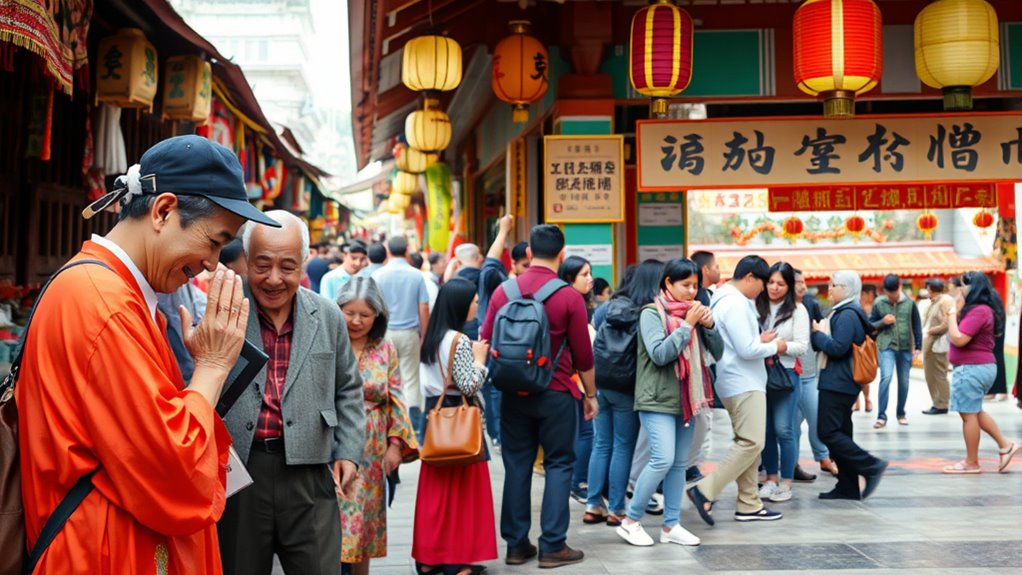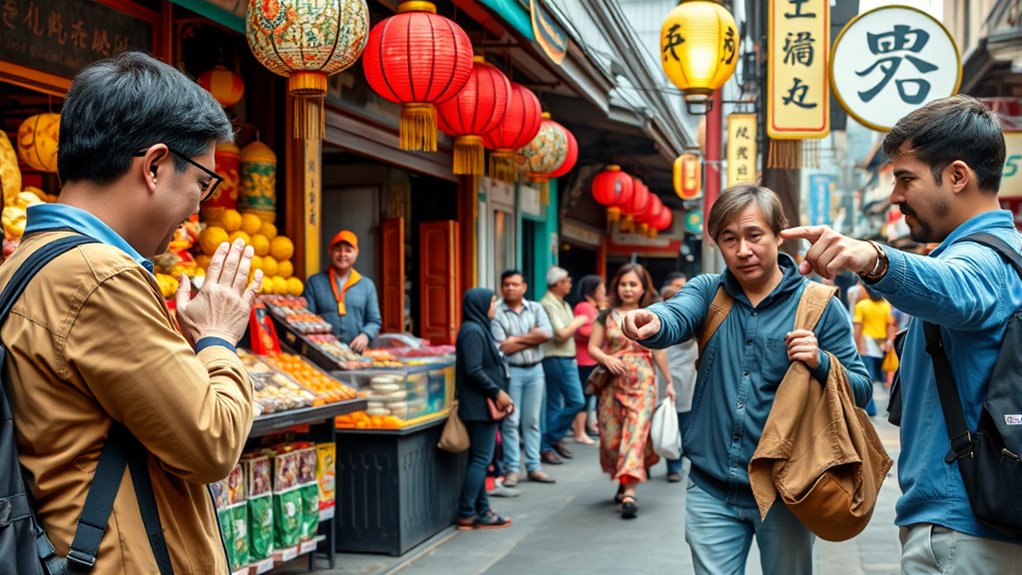When traveling abroad, it’s important to learn and respect local customs. Do greet locals with simple phrases and dress modestly at religious sites. Don’t neglect cultural traditions—remove shoes when entering homes and avoid offensive gestures. Do try local foods and be mindful of photography restrictions. Don’t forget to observe communication styles and tipping customs to show respect. Continuing with these tips will help you navigate new environments smoothly and build meaningful connections.
Key Takeaways
- Learn and use basic local greetings to show respect and build rapport.
- Dress modestly and follow cultural dress codes, especially at religious sites.
- Respect sacred places by removing shoes and adhering to photography rules.
- Engage with local cuisine respectfully and be mindful of food-related customs.
- Observe communication styles and tipping practices to demonstrate cultural awareness.

When traveling abroad, understanding and respecting local cultural etiquette can make your experience more enjoyable and help you avoid misunderstandings. As a travel enthusiast, you’re eager to explore new places and connect with locals. Mastering cultural etiquette not only enriches your journey but also shows your respect for their traditions. Whether you’re wandering through Asian markets or sipping coffee in European cafes, knowing the do’s and don’ts can prevent awkward moments and foster genuine interactions. Remember, a little effort to respect norms goes a long way in making your trip memorable. Ready to immerse yourself? Let’s explore some essential tips for traversing cultural etiquette abroad.
Respect local customs to enhance your travel experience and build authentic connections worldwide.
First, learn basic greeting phrases in the local language. Simple words like “hello,” “thank you,” or “good morning” can create a warm first impression. It shows you’ve made an effort to connect and respect their culture. Don’t assume that customs are the same as at home. For example, what’s considered polite in one country might be offensive elsewhere. Take the time to research local traditions before you arrive. When visiting religious sites, dress modestly—covering shoulders and knees when necessary. Respect the sacred by avoiding revealing clothing or casual attire. Be aware that gestures like pointing with your feet or hands can be inappropriate in some cultures; always observe what locals do and follow suit.
When entering someone’s home, it’s customary to remove your shoes, so be prepared. Also, be cautious about discussing sensitive political or social issues, as these topics can be taboo or lead to uncomfortable conversations. Instead, focus on appreciating the local cuisine by trying new foods—it’s a wonderful way to connect and learn about their culture. Always check whether photography is permitted, especially in religious or military sites, and respect any restrictions. When giving or receiving gifts, do so with both hands if it’s the cultural norm; this gesture signifies respect and sincerity.
Being aware of cultural differences in communication styles can greatly enhance your interactions and prevent misunderstandings. Lastly, don’t ignore local tipping customs. In some countries, tipping is expected and appreciated, while in others, it may be considered rude or unnecessary. Knowing these details can prevent awkwardness and show your attentiveness. Social customs and communication styles vary widely, so observe how locals interact and adapt accordingly. By paying attention to these details, you demonstrate genuine respect, which will enrich your travel experience and foster meaningful connections. Remember, showing cultural sensitivity isn’t just about avoiding faux pas—it’s about embracing the diversity that makes each destination unique.
Frequently Asked Questions
How Do I Handle Language Barriers Politely?
When facing language barriers, you should stay patient and respectful. Use translation tips like simple words or gestures to communicate. Learning polite phrases such as “please,” “thank you,” and “excuse me” can go a long way. If you’re unsure, don’t hesitate to ask for help politely. Remember, showing appreciation for their language and culture demonstrates your respect and makes the interaction smoother.
What Gestures Are Considered Offensive in Specific Countries?
You should avoid gestures to prevent, such as pointing with your finger, giving the thumbs-up in some countries, or crossing your fingers. These gestures can lead to cultural misunderstandings and offend locals. In certain places, a simple wave or nod works better. Recognize that gestures hold different meanings worldwide, so respect these differences. Being aware of offensive gestures helps you communicate respectfully and ensures your travels are smooth and positive.
Are Tipping Customs Different Across Cultures?
Tipping etiquette varies widely across cultures, so you should always consider local customs to avoid offending anyone. In some countries, tipping is expected and appreciated, while in others, it might be seen as unnecessary or even rude. Be mindful of cultural sensitivities, and research tipping practices before you travel. This shows respect and helps you navigate social norms smoothly, ensuring your interactions remain positive and respectful.
How Should I Dress for Religious Sites?
When visiting religious sites, you should dress in respectful clothing that aligns with the site’s customs. Wear appropriate attire, such as long pants or skirts and covered shoulders, to show respect. Avoid revealing or casual clothing like tank tops or shorts. Always research specific dress codes beforehand to guarantee your attire is suitable. Wearing respectful clothing demonstrates your understanding and appreciation of the religious significance, creating a positive impression.
What Are Common Mistakes Tourists Make in Local Customs?
Ever wonder if you’re respecting local customs? Many tourists slip up by ignoring local dress codes or mishandling souvenir etiquette. You might think you’re just shopping or dressing casually, but it can offend or disrespect the community. To avoid this, research the appropriate attire and ask about proper souvenir etiquette. Showing genuine respect helps you connect and guarantees a positive experience, rather than making common mistakes that could tarnish your trip.
Conclusion
By keeping these do’s and don’ts in mind, you’ll navigate new cultures with grace, avoiding faux pas and making genuine connections. Remember, respecting local customs isn’t just etiquette—it’s a bridge to understanding, much like a trusty compass guiding you through unfamiliar terrain. So, embrace the adventure, stay curious, and approach each encounter with an open mind. After all, travel’s greatest treasure is the stories you’ll tell, just like a well-worn journal from a bygone era.








